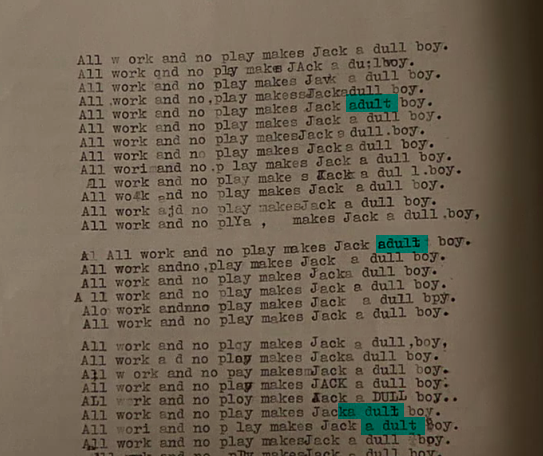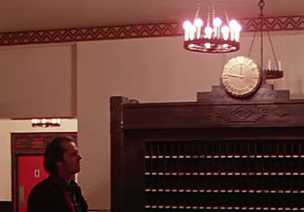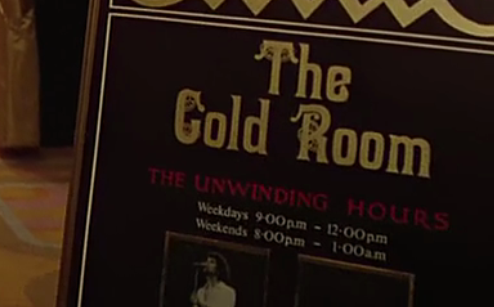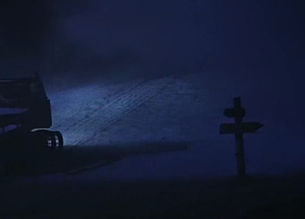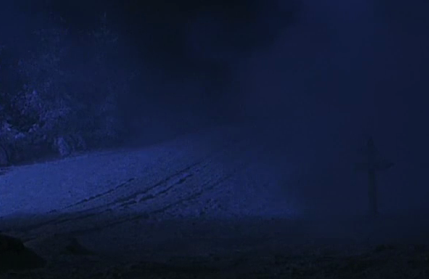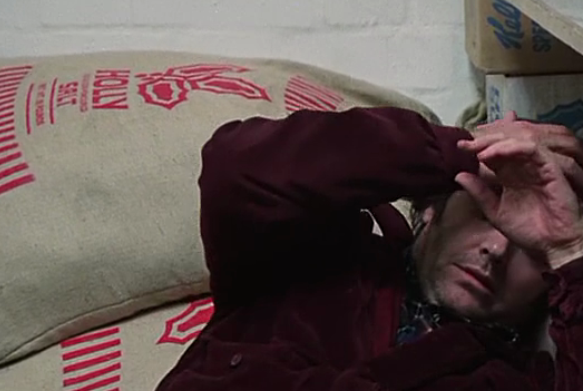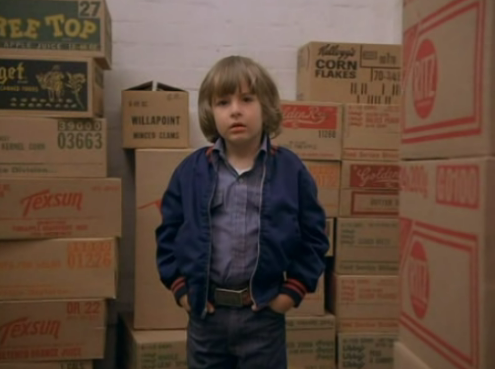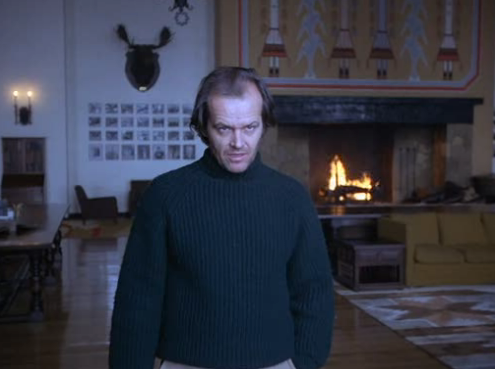CHAPTER NINETEEN In chapter eight we explored the idea that the room 237 sequence was actually a dream in which Jack Torrance symbolically represented Danny, while the laughing hag was a manifestation of Jack himself as the strangler and abuser of his son, and the woman rising out of the bath tub represented Danny awakening from his amnesia. Here we will take this notion of interchanging appearances of Jack and Danny and apply it to several other scenes. Before we do this I’d like to bring to your attention a subliminal detail that literally “spells out” the interchanging appearances of Jack and Danny. If you’ve read much about the production history of The Shining then you’ll probably be aware of the rumours that Kubrick had one of his assistants manually type out the line “All work and no play makes Jack a dull boy” thousands of times. The end result is shown in the film as Jack’s manuscript, however only 16 pages of this text appear on screen. The lines are formed into varying paragraph sizes and patterned shapes. The formats of certain pages could carry several implications, such as the pages of a screenplay, but it’s the deliberate inclusion of varied spelling and grammar mistakes in which we find Kubrick’s embedded message. It appears four times on the second to last page that we see, although with slight alterations in spelling. “All work and no play makes Jack adult boy”
How could Jack misspell the words “a dull” as “adult”? The “t” key on a typewriter is four letters across and one line up from the “l” key. It’s too far away. Then there’s the fact that the mistake occurs on the second letter of a double consonant. If Jack was able to find the correct key to type the first “l” then how would his finger manage to wonder across to the “t” instead of just double-tapping for the second “l”? Quite simply, the spelling mistake was deliberate. Kubrick cleverly allowed his audience to glance over a few pages of irrelevant repetitions of the same text so that the “adult boy” message would bypass their attention. The pages also weren’t on screen long enough for the message to be noticed in cinemas and tv screenings. Only the pause facility of VHS and DVD players would allow an inquisitive viewer enough time to find this hidden sentence. After Jack discovers Wendy reading the pages he speaks a line that may be a sly reference to the subliminal content of the manuscript, “Maybe it was about Danny. Maybe it was about him.” In several scenes Danny enters a trance-like state, in which he speaks dialogue in a gruff voice. Based upon him adopting a similar voice when in conversation with his imaginary friend, Tony, it’s easy to assume that every instance of him speaking in a gruff voice is a manifestation of Tony. There are some details that suggest otherwise. The scenes of Danny speaking in gruff voices can be broadly categorized into two types – those in which the voice is accompanied by him wagging his index finger and those that aren’t. I believe this to be a simple indicator of when Danny is speaking as Tony and when he is speaking as his father. Let’s just run through the various scenes in which Danny uses this gruff voice and examine its effect on the narrative. At the breakfast table at the start of the film, in his first bathroom Shining episode and after seeing the dead twins … he wags his finger. In these scenes he is speaking the voice of Tony. The first change comes in a scene that isn’t in the European cut of the film. We cut directly from the Jack / Grady lavatory discussion to a shot of Wendy pacing around in the apartment as she tries to work out a plan to escape the hotel. After a minute or so she hears Danny saying “redrum” in his bedroom in a gruff voice, but when she goes in to the room Danny isn’t wagging his finger. The timing is important because Jack was just entering into a discussion with Grady (himself) about how to “correct” (murder / abuse) his family problem. Danny’s repetition of the line “redrum” is happening in parallel with Jack’s decision to commit murder. We’re not hearing Tony’s voice in this scene. We’re hearing Jack. The next manifestation of Danny’s gruff voice is heard in another scene that’s absent from the European release. Wendy and Danny are sat on the Torrance apartment bed watching Roadrunner cartoons. Danny is in a trance-like state. Wendy tells him she’s going to “talk to Daddy” (Jack?) and he responds “Yes Mrs Torrance”. He uses the gruff voice and wags his finger. So we’re back to hearing Tony again. The next relevant scene is by far the most prominent example of Jack speaking through Danny in a gruff voice. Jack has just been released from the kitchen storeroom, Wendy is asleep in bed and Danny is pacing about mumbling “redrum” in a gruff voice … without wagging his finger. Everything Danny does in this scene parallels what Jack is doing elsewhere in the hotel. Jack is intending to kill his family, while Danny chants “redrum” (murder). Jack is fetching an axe and making sure it’s sharp, while Danny picks up a knife and makes sure it’s sharp. Jack is getting closer and closer to the apartment and working up his killer instinct, while Danny’s chanting of “redrum” gets faster and louder. Danny even manages to anticipate what is about to happen by writing “redrum” on the bathroom door because this is where the murder will take place. The separation of Danny’s alter ego voices into manifestations of Tony and Jack, through the presence / absence of his wagging finger, fits very well throughout the film. However, it carries some other implications relating to the hidden narrative. When Danny is chanting “redrum” in his bedroom Wendy tries to calm him. He responds with the following statements, “Danny’s not here Mrs Torrance … Danny can’t wake up Mrs Torrance … Danny’s gone away Mrs Torrance”. From this the scene dissolves to Jack walking, trance-like, through the lobby before sabotaging the radio in Ullman’s office. Is this Danny manifested through Jack’s body - the “adult boy” referred to in the manuscript? A particular supporting detail is that in the lobby the “adult boy” passes a clock. It’s time reads 11.46 (see HD version).
Also in the HD version we get a good look at the Gold Room sign just before Jack has his first conversation with Lloyd.
It says “THE UNWINDING HOURS … Weekdays 9:00pm – 12:00pm … Weekends 8:00pm – 1:00am”. Being that Jack likes to spend his time drinking in the Gold Room, perhaps the 11:45 timing of the radio sabotage scene is an indicator that Danny sabotaged the radio while Jack was drinking in the Gold Room. Here we’re getting into a mysterious aspect of the hidden narrative that I haven’t quite figured out, but I’ll offer my thoughts so far. There are many details that suggest Danny, having recovered from his amnesia and seen his father for the psychopath that he is, has set an elaborate trap to kill Jack.
As a point of interest, the shot of Wendy and Danny escaping the Overlook in a snowcat shows a double-cross signpost sticking out of the snow. After the snowcat climbs off into the distance a cloud of mist floats on screen and obscures both the snowcat and the double-cross. Double cross of course means to “betray”.
So it’s possible that Danny sabotaged the radio as a way of isolating Jack from his equally sordid employers. The only detail I’ve found that directly contradicts this is that Jack tells Wendy through the store room door “You’re not going anywhere. Go check out the snowcat and the radio and you’ll see what I mean”. Of course Jack hasn’t specifically said that he sabotaged the radio. Perhaps he means that he’s sabotaged the snowcat and that the radio will be spouting news of bad weather. Danny and Jack’s maze chase also seems to be mirrored in the Overlook, which it should be because the maze is a symbol of the Overlook anyway.
The seeds of Danny’s plan have also been suggested by a user on my forum to have originated in the room 237 dream sequence. Danny the “adult boy” treads backwards through his own footsteps, away from the rotting woman (abusive father) and locks her in. The one truly convincing detail of the film in support of the supernatural surface narrative is the moment when Jack is released from the store room, supposedly by Grady’s ghost. During interviews about the film Kubrick cited this as the final moment that reveals the hotel is haunted, but we’ve been deceived by cryptic comments from Kubrick many-a-time. I’ve identified four other possibilities for your consideration.
One last detail that possibly cross references the interchanging identities of Jack and Danny is that in the first storeroom scene Danny stands in a trance with his hands in his pockets as he shines Halloran talking to him. In the Colorado Lounge we later see Jack staring at the false light of the window with his left hand in his pocket. Both shots feature a slow zoom and share the same piece of music.
An additional note, and possibly Kubrick's most personal message of the film, is that Danny and Wendy's escape from the hotel (America) mirrors Stanley and Christiane Kubrick's abandonment of America. It was around the time of shooting Dr Strangelove, a highly political film, that Kubrick began his carefully crafted avoidance of public attention and his commitment never to return to the US, not even for a visit. Kubrick also made many cross references between himself and the Jack Torrance character (see chapter 10), as well as establishing the "adult boy" theme described above. Is the "adult boy", who breaks the generational cycle of abuse at the Overlook, a self-reference on Stanley's part? Is Jack's manuscript a representation of the film itself, appearing on the surface to be an endless repetition of the same old tired story "All work and no play makes Jack a dull boy", only to later reveal upon careful inspection to be something else - Kubrick covertly bringing conscious awareness of genocidal history and elitist corruption to those who "shine"?
|
